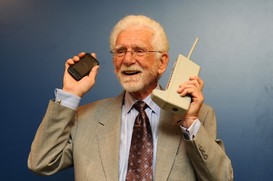Technology
Creating technology is applying knowledge towards inventing beneficial products. The word technology comes from two Greek words: techne, meaning "art" or "craft", and logos, meaning "logic" or "reason. Technology has been evolving since the first tools were created up to 2.5 million years ago. Some are born with the talents and skills needed to build, however it doesn't come as easily to others. It is believed to be as much of a talent to know how to use technology, as it is to create it. Using past tools and methods, we are able to learn and build from our origins and create more complex technology.
The Evolution of Technology
Technology is able to produce and understand information of which DNA tissue is incapable. In his book, What is Life, Erwin Schrodinger brings up an interesting question: “Are we automatons?” Are we becoming like technology, or is technology becoming like us? This question is a difficult one to answer, and many scientists have different theories about the evolution of technology and what it will become.
Is Earth alive? Our wonderful planet can regulate its temperature and is made out of molecules. However, it does not reproduce, a trait that living organisms are supposed to be able to do.
Technology is able to produce and understand information of which DNA tissue is incapable. In his book, What is Life, Erwin Schrodinger brings up an interesting question: “Are we automatons?” Are we becoming like technology, or is technology becoming like us? This question is a difficult one to answer, and many scientists have different theories about the evolution of technology and what it will become.
Is Earth alive? Our wonderful planet can regulate its temperature and is made out of molecules. However, it does not reproduce, a trait that living organisms are supposed to be able to do.
Origin of the Television
The television's fundamental principles were initially explored using electromechanical methods to scan, transmit and reproduce an image. Paul Nipkow, a German university student, proposed and patented the first electromechanical television system in 1884, however he never built a working model of the system. His ideas and sketches for the creation were used to help make physical models until 1939. Constantin Perskyi coined the word television in 1900. However, it was not until 1907 that enough technological discoveries were made for this design to be made an actuality.The first demonstration of the instantaneous transmission of still images was done in Paris in 1909. However, sice television is defined as the live transmission of moving images, John Logie Baird first achieved this privately on October 2, 1925 and demonstrated it to the world on January 26, 1926. From then, the television has continued to evolve.
The television's fundamental principles were initially explored using electromechanical methods to scan, transmit and reproduce an image. Paul Nipkow, a German university student, proposed and patented the first electromechanical television system in 1884, however he never built a working model of the system. His ideas and sketches for the creation were used to help make physical models until 1939. Constantin Perskyi coined the word television in 1900. However, it was not until 1907 that enough technological discoveries were made for this design to be made an actuality.The first demonstration of the instantaneous transmission of still images was done in Paris in 1909. However, sice television is defined as the live transmission of moving images, John Logie Baird first achieved this privately on October 2, 1925 and demonstrated it to the world on January 26, 1926. From then, the television has continued to evolve.
Origin of Mobile Phones:
Before mobile phones, scientists experimented with mobile telephony concepts, which is the provision of telephone services to phones that can move around freely instead of staying in a fixed location, a necessary breakthrough during the years after World War II when communication was vital. At first, these mobile telephony concepts were used with two-way radios, or radiophones. However, this idea soon developed into the modern cell-phones that we use today. Public mobile phone systems were first introduced in the years after the Second World War and made use of technology developed before and during the conflict. Martin Cooper is the American inventor credited with the first development of the mobile phone in the 1970s.
Before mobile phones, scientists experimented with mobile telephony concepts, which is the provision of telephone services to phones that can move around freely instead of staying in a fixed location, a necessary breakthrough during the years after World War II when communication was vital. At first, these mobile telephony concepts were used with two-way radios, or radiophones. However, this idea soon developed into the modern cell-phones that we use today. Public mobile phone systems were first introduced in the years after the Second World War and made use of technology developed before and during the conflict. Martin Cooper is the American inventor credited with the first development of the mobile phone in the 1970s.
It’s almost impossible to expect, or predict what is coming next in technology because of all of the extraordinary improvements that have already been made. Above is an interview with Joel Kirman, a chemical engineer, who taught a college course on the history of technology for five years. The evolution of cell phones video playing in the background shows the incredible physical change through the years of a product that we use daily.
Joel Kirman also answered several other questions regarding technology and its evolution, and the typed version of his answers are below:
1) What are the origins of technology?
Let me just say that one very important source of early technology—which is was then, now it’s life—was the great area called the fertile crescent, in the middle east. The area is a big ark that goes from Israel, Syria, into Turkey and into Iraq. And that’s where the first Neolithic cities were built, based on the ability to farm crops that could be renewed every year, especially wheat and barley. And that led to domestication of animals, and ultimately to the building of cities. So I would add that it’s not the first area where technology started, but it’s a very important one that should be understood.
2) Are the origins of technology important?
The earliest technologies were formed before there were written languages. So we can always remise what they are from the artifacts that we find. The arrowheads that we used 40 thousand years ago were formed by making chips. People find those arrow heads and they surmise how they were made and how they were used. But no one explicitly wrote down how they were made. The earliest technologies, like the earliest lamp, which were little dishes in which animal fat as oil was burnt, nobody wrote how it was done. But the artifacts suggest the answer itself.
3) How has technology evolved?
It’s an unbelievable story—I think it’s more amazing than how the human race has expanded since then. It’s a vast story and it’s just part of being human today is how we’ve contributed to changing our own environment by all of the improvements. It’s a big story how it’s evolved. And every century, or every ten years, sees major changes.
4) What do you think technology holds for us in the future?
You know, it’s said, that we can predict everything except the future. But all the evidence is that it will continue to evolve. In about 1840, the head of the patent office of the United States thought he should close down the office because all useful inventions had already been made. And he wanted to see how things would change. There’s no telling where we are going. And I feel that where there’s no ends to these improvements and changes. Well the railroads are a great thing, but they burn coal. When you have a few railroads it’s not much of an environmental problem. But when you have lots of railroads, you burn coal, coal requires mining, which puts green house gases into the air and damages the low-lying areas where the spoil from mining the coal is deposited. So each of these changes bring problems, but they are irreversible. I think technology will continue to evolve, continue to make better things for people, but will also bring problems along with them. For instance, there’s the wonderful thing to have the ability to communicate immediately with everybody around the world. On the other hand, it does create harm, I think, to the human psyche, to be on the phone all the time is trivial. Well the inventors of the cell phone didn’t plan that to be the case, but it happened. And we have to learn to deal with it.
5) Some say that soon, technology will surpass humans, and that humans won’t be able to control the technology anymore, do you think that’s true?
It’s partly true. Right now, I can’t control where planes fly, they fly over my home. And if there’s a crash, or I get hit by one, that I can’t control. But all I can do is to try to use my influence to vote, and to see that we have a government that is reasonable in assigning passes to various airplanes. The same with the internet, and with drugs. Some drugs have medical promise, but they can also be abused. And we need rules to guide us. But no individual can possibly comprehend all of technology. And so there has to be some sort of control on what is produced.
6) Is technology, in a sense, alive?
To some extent, that’s always been the case, and maybe it’s even more so today. In the Middle Ages, when they started to put up clocks in the church towers of all the towns, some would say it was a good thing—you didn’t have to worry about where the sun was, and they could say to someone, “I’ll meet you at such an hour, at the square”. But then one day a merchant said, “you know, I can’t stand those clocks anymore, they force me to divide my day up into little pieces.” I mean, he was not so time nervous as before, because he had a clock to follow. But in a way, technology is forcing us to make adaptations like that all the time.
Joel Kirman also answered several other questions regarding technology and its evolution, and the typed version of his answers are below:
1) What are the origins of technology?
Let me just say that one very important source of early technology—which is was then, now it’s life—was the great area called the fertile crescent, in the middle east. The area is a big ark that goes from Israel, Syria, into Turkey and into Iraq. And that’s where the first Neolithic cities were built, based on the ability to farm crops that could be renewed every year, especially wheat and barley. And that led to domestication of animals, and ultimately to the building of cities. So I would add that it’s not the first area where technology started, but it’s a very important one that should be understood.
2) Are the origins of technology important?
The earliest technologies were formed before there were written languages. So we can always remise what they are from the artifacts that we find. The arrowheads that we used 40 thousand years ago were formed by making chips. People find those arrow heads and they surmise how they were made and how they were used. But no one explicitly wrote down how they were made. The earliest technologies, like the earliest lamp, which were little dishes in which animal fat as oil was burnt, nobody wrote how it was done. But the artifacts suggest the answer itself.
3) How has technology evolved?
It’s an unbelievable story—I think it’s more amazing than how the human race has expanded since then. It’s a vast story and it’s just part of being human today is how we’ve contributed to changing our own environment by all of the improvements. It’s a big story how it’s evolved. And every century, or every ten years, sees major changes.
4) What do you think technology holds for us in the future?
You know, it’s said, that we can predict everything except the future. But all the evidence is that it will continue to evolve. In about 1840, the head of the patent office of the United States thought he should close down the office because all useful inventions had already been made. And he wanted to see how things would change. There’s no telling where we are going. And I feel that where there’s no ends to these improvements and changes. Well the railroads are a great thing, but they burn coal. When you have a few railroads it’s not much of an environmental problem. But when you have lots of railroads, you burn coal, coal requires mining, which puts green house gases into the air and damages the low-lying areas where the spoil from mining the coal is deposited. So each of these changes bring problems, but they are irreversible. I think technology will continue to evolve, continue to make better things for people, but will also bring problems along with them. For instance, there’s the wonderful thing to have the ability to communicate immediately with everybody around the world. On the other hand, it does create harm, I think, to the human psyche, to be on the phone all the time is trivial. Well the inventors of the cell phone didn’t plan that to be the case, but it happened. And we have to learn to deal with it.
5) Some say that soon, technology will surpass humans, and that humans won’t be able to control the technology anymore, do you think that’s true?
It’s partly true. Right now, I can’t control where planes fly, they fly over my home. And if there’s a crash, or I get hit by one, that I can’t control. But all I can do is to try to use my influence to vote, and to see that we have a government that is reasonable in assigning passes to various airplanes. The same with the internet, and with drugs. Some drugs have medical promise, but they can also be abused. And we need rules to guide us. But no individual can possibly comprehend all of technology. And so there has to be some sort of control on what is produced.
6) Is technology, in a sense, alive?
To some extent, that’s always been the case, and maybe it’s even more so today. In the Middle Ages, when they started to put up clocks in the church towers of all the towns, some would say it was a good thing—you didn’t have to worry about where the sun was, and they could say to someone, “I’ll meet you at such an hour, at the square”. But then one day a merchant said, “you know, I can’t stand those clocks anymore, they force me to divide my day up into little pieces.” I mean, he was not so time nervous as before, because he had a clock to follow. But in a way, technology is forcing us to make adaptations like that all the time.
Discoveries
A discovery is really just a beginning. When a new discovery is made, many doors are opened, and people begin to look at the world in a whole new way. When Mark Zuckerberg launched Facebook in 2004, he unraveled the world into a new phenomenon of technology that had never been seen before. The site gave a new meaning to the term social networking. With more than 600 million active users, this site has grown at an exponential rate since it was launched, despite some conflicts that Zuckerberg had along the way. The creation of Facebook developed an entirly new world where people could be connected without having any physical interaction.
Before social networking, the internet was still a major mode of communication of connection between people. However, with the discovery of Facebook, creating online relationships has been easier and more efficient, allowing people to interact with each other daily, even if they live miles away.
A discovery is really just a beginning. When a new discovery is made, many doors are opened, and people begin to look at the world in a whole new way. When Mark Zuckerberg launched Facebook in 2004, he unraveled the world into a new phenomenon of technology that had never been seen before. The site gave a new meaning to the term social networking. With more than 600 million active users, this site has grown at an exponential rate since it was launched, despite some conflicts that Zuckerberg had along the way. The creation of Facebook developed an entirly new world where people could be connected without having any physical interaction.
Before social networking, the internet was still a major mode of communication of connection between people. However, with the discovery of Facebook, creating online relationships has been easier and more efficient, allowing people to interact with each other daily, even if they live miles away.
Sources
- http://2.bp.blogspot.com/_9UxHwUfG2qQ/TGtaI8AJjCI/AAAAAAAABv4/VB9YwTNxCEc/s1600/martin-cooper.jpg
- http://en.wikipedia.org/wiki/History_of_television
- http://www.nicomovil.com/wp-content/uploads/2011/04/first-television.jpg
- http://www.appletvhacks.net/wp-content/uploads/2010/08/apple-flatscreen-tv.jpg



